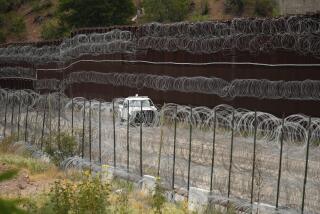U.S. and Mexico agree to extend border restrictions through July 21
- Share via
Travel restrictions at the U.S-Mexico border will remain in place through July 21, officials said Tuesday.
“Mexico and the United States have agreed to extend for 30 days more restrictions on nonessential land traffic on their common border, after reviewing the development of the spread of COVID-19 in both countries,” Mexico’s Foreign Ministry said on Twitter.
“The restrictions will remain in the same terms as implemented since March 21. Both countries will continue coordinating sanitary measures in the border region.”
This is the third time border restrictions have been extended for an additional month since the initial joint agreement in March was adopted as a measure to prevent the spread of COVID-19. The current restrictions were set to expire next week.
Northbound crossings remain open for U.S. citizens, legal permanent residents, people with work visas and those traveling for educational or medical reasons, among other reasons deemed essential. Crossings remain closed for recreational and tourist travel.
Travel restrictions also were extended at the U.S-Canada border, according to the U.S. Department of Homeland Security.
“Based on the success of the existing restrictions and the emergence of additional global COVID-19 hot spots, the department will continue to limit nonessential travel at our land ports of entry with Canada and Mexico,” acting Secretary Chad Wolf said in a statement.
“This extension protects Americans while keeping essential trade and travel flowing as we reopen the American economy,” he added.
The San Ysidro Chamber of Commerce last week sent a letter to Wolf advocating for the removal of border restrictions.
“As California and Mexico lift restrictions based on improved health results, our local, county and state officials have implemented policy, practices and procedures to keep our businesses, employees and community safe in the face of infected visitors,” said Jason Wells, executive director of the San Ysidro Chamber of Commerce.
“We ask for the opportunity to enact these policies while reestablishing our livelihood.”
He emphasized that “restricting daily travelers between our countries, who invest in binational commerce through the goods and services they acquire, is leaving border communities economically paralyzed.”
Wells expressed disappointment Tuesday after learning about the extension of the travel restrictions. He estimates that San Ysidro is losing more than $1.8 million every day under the restrictions.
“Destroying economies like ours, like San Diego’s, is not the way to fight the virus. You fight the virus with masks, gloves, social distancing and other measures.”
He said the San Ysidro Chamber of Commerce will begin a campaign Tuesday to demand that local, state and federal officials advocate for the region’s economy.
More to Read
Sign up for Essential California
The most important California stories and recommendations in your inbox every morning.
You may occasionally receive promotional content from the Los Angeles Times.










